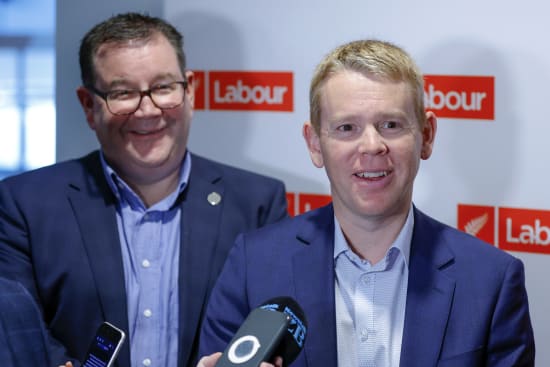[ad_1]

First published AUG 13, 2023
Updated 2 hours ago
Comment
Comment: Labour’s tax plan is the sausage roll of policy: Broadly popular, yes, but uninspiring and empty where it matters, Marc Daalder writes
One has to wonder whether the Labour Party has replaced all of its policy staff with the reckons of a ChatGPT bot that has been fed a steady diet of Talbot Mills polling numbers and focus group transcripts.
That’s one way to explain the unambitious tax policy released on Sunday: To strip GST from fresh and frozen fruit and vegetables, saving the lowest-income households a little more than $2 a week – and to boost family tax credits for low- and middle-income workers with children.
For those on the lowest incomes who have one to three kids, the latter changes could add an extra $25 a week to their wallets. Those earning above $42,700 a year will also get more in Working for Families tax credits from a change to the abatement threshold, which would be raised to $50,000. Labour says a worker on the minimum wage would see an extra $23 a week from this adjustment.
READ MORE:* Auckland MPs go head-to-head on the revenue crunch* Raw Politics: Politicians and things we’ll never see* Taking the public pulse with political polls
While the tax credits will have the largest impact, because they are targeted, the GST-free policy will save high-income households as much as five times more than the those earning the least, according to an analysis by the NZ Herald, up to $583 annually.
Households on the lowest incomes, the Herald found, would save just $2.21 a week or $115 a year.
For context, the cost of living payments from last year which were also targeted at low-income families were worth three times as much. The combined tax changes announced on Sunday will have so little impact on government revenue that they can be funded through normal Budget processes rather than any new revenue-gathering tools.
The policy’s harshest critic in the weeks to come will probably be Labour’s Grant Robertson, whose previous comments calling GST exemptions a “boondoggle” will feature heavily in attack ads on broadcast and social media.
So why is Labour promising anchoring its cost of living policy on a tweak which will have a negligible effect on household budgets for the poorest New Zealanders and which it has previously ridiculed?
A report in the Herald on Sunday provides the likely answer: “A Talbot Mills poll found 66 per cent of 1296 survey respondents supported or strongly supported the policy. Eighty per cent of Labour supporters and 75 per cent of Green supporters were in favour, while 59 per cent of National supporters and 45 per cent of Act supporters also believed it was a good move. Crucially, the Herald understands the policy went down well with swing voters, of whom 80 per cent were in favour, according to the poll conducted from July 28 to August 2.”
To be fair to Labour, they packed a community hall in Lower Hutt for Sunday’s announcement. More than 150 people showed up to hear Chris Hipkins and other senior ministers speak. It was standing room only.
Bad policies which parties believe in are understandable. Policy which clashes with a party’s values can be excused if it works.
This is neither. This isn’t a policy Labour believes in, it’s a policy Labour believes will win. The party has made policy by focus group rather than by principle or evidence base.
The tax policy also doesn’t help answer the key question which still looms over Hipkins: We’ve seen what he doesn’t believe in (wealth taxes, hate speech laws, the public sector media merger) but what does he want? Sunday’s announcement leaves the impression that Chris Hipkins supports whatever gets him another term of Parliament.
Labour thinks Hipkins comes off as an every-man, with his endless references to “bread and butter issues” (including two on Sunday). But when he’s so obviously making calls based on focus group, he looks like any other cynical career politician.
That’s highlighted by what was missing from the tax announcement – any sense of a new tax. Labour has long argued the tax system is unfair. Plenty of its MPs still say that’s the case. The Tax Working Group suggested a range of changes, the most significant of which have all been ruled out. Just months ago, a review commissioned by then-Revenue Minister David Parker reported the 311 wealthiest families in the country pay less in tax than the median earner.
Voters see Labour looking at this and deciding to do nothing. If Labour MPs truly believed the tax system was unfair, would they really lock themselves out of changing that if they get re-elected? The electorate is left with the impression Labour is either lying about the fairness of the tax system, lying about its plans for tax once elected, or worst of all, just doesn’t care.
“Really?” they’ll ask. “You get three more years with the the levers of power and that’s all you want to do? Make a kilo of bananas 49 cents cheaper?”
It’s the sausage roll of policy – popular, sure, but uninspiring. It’s a sugar hit and when the voters come down, they’ll see how un-nourishing it all is.
Much of the political commentary this year has noted how the minor parties are the ones with the big ideas, while Labour and National fight it out in the centre to do nothing. But National has departed a bit from that in recent weeks, offering up big spending on roads and a crackdown on crime. Maybe the costings are wrong, maybe the policies won’t work. At least, though, National believes in the policies.
Compare that to Labour, crowing about 41 cents off a kilo of potatoes, and it’s easy to understand why the polls are trending the way they are.
[ad_2]
Source link



